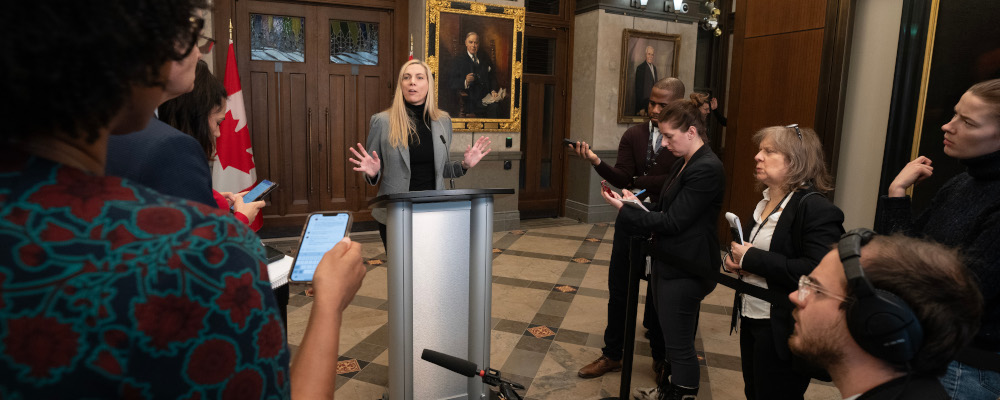There were some long faces in the news industry last week when Heritage Minister Pascale St-Onge rolled out the final terms of her surrender to reality.
Media executives who once campaigned for the Online News Act with sugar-plum visions of Big Tech cash dancing in their heads were left to deal with some pretty serious lumps of coal. After years of effort to procure what they once fancied would be hundreds of millions of dollars annually from web giants, all St-Onge could bring down the chimney was a bump up in Google’s spend to $100 million.
How much the mother of all search engines was already paying to publishers is unknown, but in-the-know estimates tend to range from $30-$50 million. Splitting the difference at $40 million would mean the industry—newspapers, broadcasters, and online platforms—wound up with $60 million in fresh cash, give or take.
That’s less than the Lotto Max jackpot Rhonda Malesku of Kamloops and Ruth Bowes of Edmonton shared last summer. A lot of money for Rhonda and Ruth for sure, but for an entire industry it’s a drop in a leaky bucket.
Then there’s the fact the Act resulted in Meta blocking all news links in Canada on Facebook and Instagram. Again, the exact cost is unknown but the social media company had been spending $18 million on journalism supports plus—and here is the killer—Meta estimated it had been sending $230 million a year worth of referrals to news websites.
Even if Meta is only half right, that still leaves the news industry many tens of millions of dollars worse off. If Meta’s estimate is accurate—and no one has really debunked it—the scenario is a lot uglier.
This is what happens when you make things up.
The Act was rooted in the make-believe premise that “web giants” were profiting from “stealing” news. Legislation was designed on that basis to force Big Tech to “negotiate” commercial deals and share those profits with all news organizations.
In the end, as Michael Geist has detailed, that charade of “compensation” was dropped as the government, desperately afraid Google would follow Meta’s lead, posted regulations that essentially rewrote the Act to suit the search engine and, as an aside, puzzle lawyers. All that the media were able to salvage from the hustle was a fund they wound up fighting over like street urchins in a soup kitchen.
Here, St-Onge actually did something sensible. Her original plan was to have the fund distributed solely on a per journo basis. In other words, if there are 10,000 journalists, $100 million would turn into $10,000 per journo, never mind whether they are paid $35,000 or $150,000. The problem with that is that one in three Canadian reporters works for CBC, which is not in mortal peril. The next highest is Bell Media, whose parent company made $10 billion last year. Meanwhile, the Toronto Star is hemorrhaging at a rate of $1 million a week, small centres are becoming news deserts, and Postmedia’s stable of zombie newspapers continues to, well, zombie on.
Broadcasters would have consumed 75 percent of the loot and the vast majority of the cash would wind up with companies for whom news is not a primary aspect of their operations.
St-Onge changed that to cap private broadcasters’ windfall at 30 percent, with CBC limited to 7 percent.
That means 63 percent of the money will go to operators in the greatest peril which, for a fund resulting from a need to address industrial poverty, is at least rational.
Still, there was grumbling.
“Well, this is disappointing—sure wasn’t expecting a cap on broadcasters’ access to compensation,” Tandy Yull, vice president of policy and regulatory affairs for the Canadian Association of Broadcasters, posted on LinkedIn.
“Hey, Universe! More needs to be done to support Canadians’ most important providers of news, local radio, and television stations, who are facing significant—even existential—declines in advertising revenue,” she added.
Yull went on to stake broadcasters’ claim to government assistance currently reserved for newspapers and online-only media: the Journalism Labour Tax Credit and the Local Journalism Initiative.
And of course “our democracy demands that we explore these and other options—soon.”
She may not have long to wait.
Broadcasters opened up a fresh lobbying for loot campaign just last month when the Canadian Radio-television and Telecommunications Commission (CRTC) held a hearing to launch the implementation of the Online Streaming Act.
Supposedly about funding Canadian entertainment programming, the concept of a news fund was introduced early and repeated often.

Commissioners appeared happy to embrace well-worn lines about a news “crisis” that needs “urgent” attention to prevent—cue the tympany—the death of democracy. And they did so without needing to be persuaded there was any rational reason for creating a fund which, logically, makes no more sense than taxing cinemas to pay for newspapers. Nor were any concerns raised about impacts on entrepreneurship and online innovators.
“Local news is in crisis and requires immediate intervention,” Susan Wheeler of Rogers, which made $7.12 billion last year, told the panel.
“A fundamental outcome of the modernized contribution regime must include new mechanisms to provide long‑term financial support for high‑quality Canadian‑produced broadcast news from credible outlets,” she said, calling for 30 percent of money raised from foreign online streaming companies to be directed to a news fund “accessible by all private TV and radio stations producing news.”
The humiliating squabbling over the remnant scraps of the Online News Act clearly wasn’t the end of the Great Canadian Quest for other people’s money.
So maybe the shakedown of Meta and Google didn’t quite work out. But Spotify, Disney+, and Netflix? They have money. Let’s mug them instead.
It’s not like anything bad could happen. Right?




